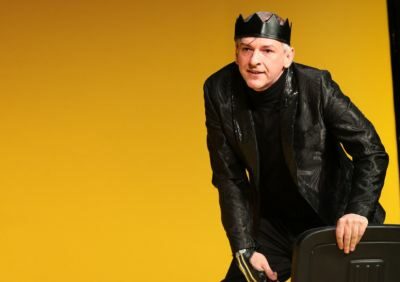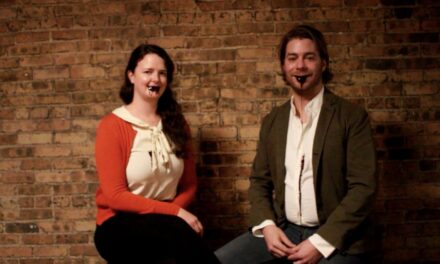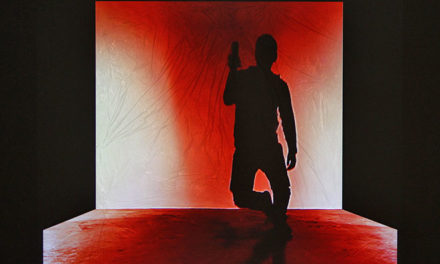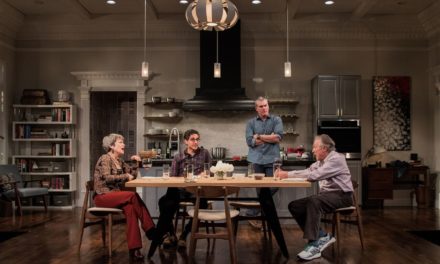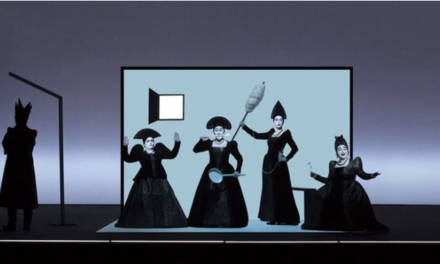Fear Eats the Soul (Átrium), The Crucible (Szombathely) and Richard III (Radnóti Színház) – these are only a few of the shows in which Róbert Alföldi worked in the past season. In 2018 his performances were nominated in five categories for the Theater Critics’ Award.
Revizor: You directed six plays and you played Richard III. I assume you are satisfied with the past season?
Alföldi Róbert: I would rather say that it was a year of especially good encounters. For example, with the Budaörs group this was our first project together, and in Fear Eats the Soul we had a strong team as well. As for The Crucible, this was my third joint venture with the company in Szombathely.
R: Have you worked with Judit Hernádi before?
AR: I work with her every 8 to 10 years. Once we did A Midsummer’s Night Dream in Szeged, another time we did a Czardas Princess, but never before have we collaborated on something so serious. I was twenty-something when István Horvai directed Long Day’s Journey into Night, I was the younger boy, Judit played my mother. We got along really well, we became close, and have been ever since. When I think that the material I work on would interest her, I give her a call.
R: I think that since I’ve been following Hernádi’s career, she gave the best performance I’ve seen in Fear… Perhaps because she is rarely cast in such a deep, multi-layered role.
AR: Even though Judit is an open-minded, intelligent and great actor. We can communicate with each other honestly, and because of our mutual trust, we do not need to beat around the bush.
R: Are there people with whom it is necessary to beat around the bush?
AR: Probably, but I never do (he laughs). I had a spot of trouble with German actors, for example. My work style seemed aggressive for them. Until I see the fundaments of what I want to create, I communicate very firmly, and I don’t care what anyone thinks about that. I must build up the structure that is in my head. German actors are immensely proud, and they feel I don’t involve them enough in the creative process. I, on the other hand, am unable to go on a common exploration with the actors when rehearsals start. Therefore work with them was always riddled with conflict.
R: It is a very interesting contradiction, but I always thought of the National Theatre under your direction as the theatre of democracy. Due to the concept of the repertoire on the one hand, and to the specific politics surrounding it on the other. At the same time, a theatre led by a director is a rather hierarchical institution. Can theatre work be liberal at all?
AR: The National Theatre was a liberal, free theatre, and I was a dictator in it. I don’t see the contradiction; during working hours there was a dictatorship, but exists within the theatre did not revolve around power. A leader must set rules, rules create a grownup environment for the subordinates as well: if you know what I want, you can decide if you want that, too or not. So we worked in a dictatorship, but otherwise, it did not matter who the director was. I did not go to the cafeteria as the director.
R: Liberal values were very prevalent in the repertoire. Was it important for everyone in the company to agree with that? Is it the only way to represent a political attitude on stage authentically?
AR: Not at all. But the circumstances we created enabled the colleagues to speak up if they did not agree with something.
R: Did this mean that an actor was able to reject a role?
AR: It happened. And once someone watched a show, and told me that although they did not agree with its message about the world, it was a good performance. It was always outsiders who questioned the choice of a play, never co-workers.
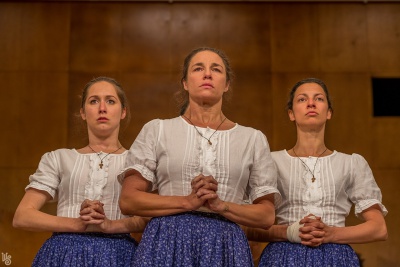
The Crucible, dir. by Róbert Alföldi, Szombathely, 2018
R: This year you are nominated in several categories of the Theatre Critics’ Award. To what extent do you think the criticism is politicized?
AR: You live here in this world, your job is to write about what others say about this world. You cannot cut yourself loose from this social environment, even if you would like to. When I read a review about Bánk Bán in the National Theatre, and the introduction of the article is about how I directed the same play there, that for me is already politicized. I am not saying this is good or bad, I am not even saying it has no legitimacy, but its meaning is strongly influenced by the social setting. And meanwhile, I bemoan how few opportunities we have to conduct meaningful discussions about the shows.
R: I also asked you a lot about politics, even though I wanted to talk about your plays. Why do you think people are reluctant to talk about the performances?
AR: They don’t dare to talk about them, as that, too is very much politicized. Moreover, we tend to take offense and treat someone’s opinion as an attack.
R: This year you directed The Crucible in Szombathely. As I was watching the play, I was wondering if you think there had been no change in the regime. It has become a commonplace to say – and I do not believe it – that there was a transition in Hungary.
AR: Of course it is not true.
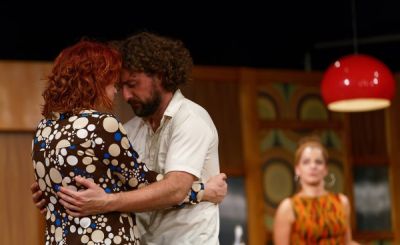
Fear Eats The Soul, dir. by Róbert Alföldi, Átrium, 2018
R: And yet the play is about how we keep on changing our symbols, but the lobby of the House of Culture and the people in it remain the same.
AR: I think we were not able to seize the opportunity. I think about the world in a certain way, I talk about my views, and I feel a social responsibility because my teachers taught me to see, to notice if someone is in trouble, to pay attention to where I live. It was expected of us, Hungarians, to know what democracy is without anyone ever explaining it to us. It is no coincidence that the same mechanisms are in operation that we got used to for 50-60 years, they are the ones we are familiar with.
R: Is it the same regression we see on stage? For instance, in the Richard III directed by Andrei Şerban, I felt that he was hiding the political content behind the text instead of saying it out loud.
AR: I don’t think Andrei’s intention was to direct a play with winks and hints. Is it not possible that you are prone to look for current political allusions in everything?
R: I don’t think so, there are present-day political references in it…
AR: I’m not saying this about Richard III, in particular, I mean the whole profession: where there is cowardice, winking returns. But in the Hungarian theatre world, there is a strong distaste for explicit messages, and the critics support this notion. It is also a question of theatre culture. In our neck of the woods very straightforward messages are not customary. If someone does talk like that to us, we sneer.
This interview was originally published in Revizor on February 15, 2019, and is reposted with permission.
This post was written by the author in their personal capacity.The opinions expressed in this article are the author’s own and do not reflect the view of The Theatre Times, their staff or collaborators.
This post was written by Puskás Panni.
The views expressed here belong to the author and do not necessarily reflect our views and opinions.

